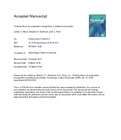| dc.contributor.creator | Perry, John | |
| dc.contributor.creator | Welsh, James C. | |
| dc.contributor.creator | Dewhurst, Stephen A. | |
| dc.date.accessioned | 2019-02-11T11:30:11Z | |
| dc.date.available | 2019-02-11T11:30:11Z | |
| dc.date.issued | 2018 | |
| dc.identifier.citation | Welsh, J. C., Dewhurst, S. A., & Perry, J. L. (2018). Thinking Aloud: An exploration of cognitions in professional snooker. Psychology of Sport and Exercise, 36, 197-208. doi: 10.1016/j.psychsport.2018.03.003. | en_US |
| dc.identifier.uri | http://hdl.handle.net/10395/2619 | |
| dc.description | Thinking aloud: An exploration of cognitions in professional snooker. | en_US |
| dc.description.abstract | Objectives: Presently, there is no exploration into the cognitive processes of super-elite and elite professional snooker players during real-time performance. Therefore, this study explored the cognitions of seven professional snooker players during real-time solo practice performance. Design: A Think Aloud (TA) protocol analysis. Method: This involved players verbalizing and explaining their thoughts within naturalistic practice environments. Player’s verbalizations were recorded during each solo practice performance, transcribed verbatim, and analyzed via protocol analysis. Results: Analyses revealed an array of continuous reactive-adaptive cognitions relating to stressors and coping strategies during performance, as well as general snooker-specific related thoughts. Specifically, the results highlighted key stressor themes which were coded as: Table Conditions, Distractions, and Mistakes. Our main finding was: Shot Preparation being essential to problem-focused coping, with Rationalizing integral to emotion-focused coping. Further results highlighted the visualperceptual and cognitive expertise of players, with regards to identification of problem balls and cueball spatial awareness, insofar as unearthing the deliberate structure to practice routines. Conclusions: The study’s original and novel findings lend further support to the transactional process of coping. Whilst accordingly, the utilization of TA significantly contributed to our limited understanding of super-elite and elite real-time cognitions in professional snooker and self-paced sports generally. Future research should continue to dissect the sport-specific nuances that underpin real-time performance, not only during practices, but within competitive play. TA is an appropriate methodology to use in the domain-specific sport of snooker. | en_US |
| dc.language.iso | eng | en_US |
| dc.publisher | Elsevier | en_US |
| dc.relation.ispartofseries | 36; | |
| dc.rights.uri | https://doi.org/10.1016/j.psychsport.2018.03.003 | en_US |
| dc.subject | Coping | en_US |
| dc.subject | Think aloud protocol | en_US |
| dc.subject | Professional snooker | en_US |
| dc.subject | Super-elite | en_US |
| dc.subject | Cognitions | en_US |
| dc.subject | Practice | en_US |
| dc.title | Thinking aloud: An exploration of cognitions in professional snooker (Pre-published version) | en_US |
| dc.type | Article | en_US |
| dc.type.supercollection | all_mic_research | en_US |
| dc.type.supercollection | mic_published_reviewed | en_US |
| dc.description.version | Yes | en_US |
| dc.identifier.doi | 10.1016/j.psychsport.2018.03.003 | |


